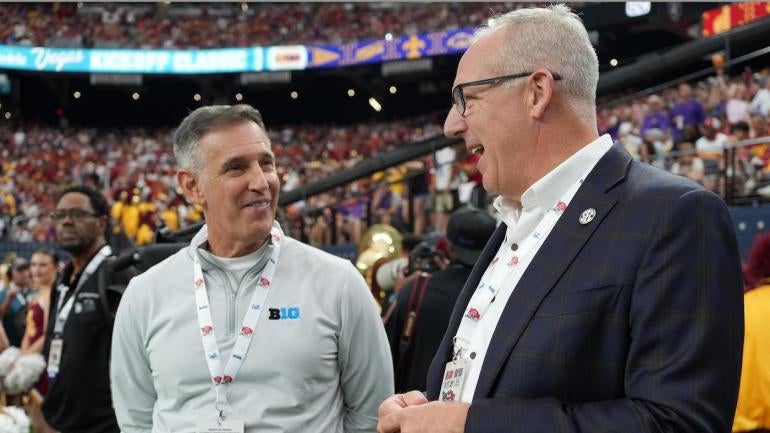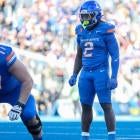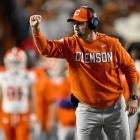
FAYETTEVILLE, Ark. -- The Big Ten and SEC make history this week as the conferences' leaders will meet to discuss and potentially develop plans to better adapt to the changes sweeping across college athletics. The topics will be broad, and perhaps no solutions will be reached, but for the first time, the two are closely aligned in their thinking as they attempt to prepare for a revenue-sharing model with players and lead the charge on reforming the rules in the new age of college athletics.
"It's an opportunity to learn from our athletic directors together," SEC commissioner Greg Sankey told CBS Sports on Saturday. "That's the primary objective. How that guides us in this time of change, I think, is an important opportunity for a conversation. It certainly is something that's not been done before."
The meeting among the athletic directors is scheduled for Wednesday and Thursday in Nashville. The in-person gathering is the result of a months-long collaboration between the conferences after they formed a joint advisory committee earlier this year to develop plans to prepare for the potential settlement of antitrust lawsuits while also exploring avenues to work together, both on and off the field. Topics expected to be discussed include more scheduling opportunities, including more bowl games, and rules enforcement models to police name, image and likeness collectives, sources told CBS Sports.
"I don't think we ever predicted we're going to automatically change the world," Sankey said. "I have said repeatedly we want to bring people into the conversation, so our athletic directors are part of that, and I'm sensitive to the others involved as well in Division I, particularly in the autonomy level. I look forward to the conversation. We'll see where it heads."
Athletic directors are especially interested in the College Football Playoff, which could expand from 12 teams to 14 starting in 2026. At stake, potentially, is the increase of automatic bids for the conferences. Earlier this year it was reported the Big Ten and SEC were pushing for three to four automatic bids in a new model, which would begin in 2026 and end in 2032 under the new contract with ESPN. One plan that picked up steam among leaders in the spring was a "3-3-2-1" model that would reward the Big Ten and SEC with three automatic bids, while the ACC and Big 12 would get two apiece.
Sankey took issue with the idea that the SEC is campaigning for more automatic berths, particularly as the landscape changes with conference realignment leading to the reformation of the Pac-12 and movement within the Mountain West Conference.
"That's not accurate. The SEC pushing? I haven't talked about it," Sankey said. "I watch these things being written, and I made a quip that nobody calls me. I've not talked about automatics since January, February, and we're going to see what happens in the playoff this year. I'm attentive to how the selection committee makes decisions and forms the field, and then we'll have an opportunity to make some more decisions on the other side."
Sankey's stance, at the surface level, seemingly follows those taken by his cohorts in the ACC and Big 12. Conference leaders agreed in the spring that more time was needed to evaluate options, and the decision to wait until after the first iteration of the 12-team playoff this fall was mutual. After all, there are variables that haven't yet been evaluated in real time.
Most importantly, how will the 13-person selection committee weigh strength of schedule in the new 12-team format? And how does that affect the thinking for the SEC as it continues to weigh whether to stick with eight conference games or move to nine starting in 2026?
After dropping their push for multiple automatic bids, the Big Ten and SEC effectively negotiated bigger paydays and more control in the CFP in the spring. They are set to receive more than 50% of the CFP revenue starting in 2026, which might at least indirectly translate to more power in the board room as well.
"We've got to let this thing play out, see where it goes and then have some thoughtful conversation to follow," Big 12 commissioner Brett Yormark told the Houston Chronicle last week. "One thing is for sure -- fans don't want an artificial championship. They want a real championship just like every other sport. There are no free passes. Let's earn it."
Big Ten and SEC athletic directors are also expected to discuss creating new Big Ten and SEC matchups in sports that could lead to new television packages and revenue streams for the conferences. Sankey scoffed at reports of a scheduling partnership, but athletic directors in both conferences have ideas that will be discussed Thursday.
"I was at the Texas-Michigan game in Ann Arbor. It was my first time there. LSU-USC was a great opportunity, I think, and the interest showed," Sankey said. "We have bowl games with the Big Ten, we have bowl games with the ACC, we have bowl games with the Big 12. So those provide some common points of interest, and there's a lot happening. We're all waiting to see what happens with the proposed (House v. NCAA) settlement and how we adapt and those realities. Those provide kind of easy conversation points."
Perhaps the most important topic on Wednesday will be how the conferences should police sports within a new revenue-sharing model, which is expected to carry an annual expense of at least $22 million to pay athletes starting in the fall of 2025. Sankey has openly criticized the NCAA's governance structure in the past and believes the Big Ten and SEC's leaders can better create effective legislation that could translate across the organization. He recalled Saturday a subcommittee of the Division I Football Oversight Committee discussing practice seasons in previous years. The debate had more participation from the Pioneer League, an FCS conference, than the Big Ten or Big 12.
"Sitting in big rooms filled with people trying to solve big problems does not work," Sankey said. "If you have not figured that out yet, then we better change our thinking."
Meanwhile, conference leaders outside the Big Ten and SEC are concerned their partnership could lead to Sankey and Big Ten commissioner Tony Petitti exerting more power over the rest of college athletics, including the NCAA. It remains to be seen when and if the SEC and Big Ten will open the doors to other conferences for similar brainstorming sessions. However, Sankey stressed to CBS Sports he continues to communicate frequently with autonomy conference leaders.
"I've said repeatedly, and I'll say again, we want to bring people into the conversation," Sankey said. "I think that will be one of the outcomes. We'll see where it goes, though."
















